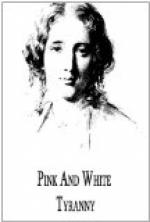“Oh! how often must I tell you not to use those odious slang terms?” said his wife, reprovingly.
“Oh! Mrs. John Seymour knows me of old,” said Mr. Follingsbee, winking facetiously at Lillie. “We’ve had many a jolly lark together; haven’t we, Lill?”
“Certainly we have,” said Lillie, affably. “But come, darling,” she added to Mrs. Follingsbee, “don’t you want to be shown your room?”
“Go it, then, my dearie; and I’ll toddle up with the fol-de-rols and what-you-may-calls,” said the incorrigible Dick. “There, wife, Mrs. John Seymour shall go first, so that you shan’t be jealous of her and me. You know we came pretty near being in interesting relations ourselves at one time; didn’t we, now?” he said with another wink.
It is said that a thorough-paced naturalist can reconstruct a whole animal from one specimen bone. In like manner, we imagine that, from these few words of dialogue, our expert readers can reconstruct Mr. and Mrs. Follingsbee: he, vulgar, shallow, sharp, keen at a bargain, and utterly without scruples; with a sort of hilarious, animal good nature that was in a state of constant ebullition. He was, as Richard Baxter said of a better man, “always in that state of hilarity that another would be in when he hath taken a cup too much.”
Dick Follingsbee began life as a peddler. He was now reputed to be master of untold wealth, kept a yacht and race-horses, ran his own theatre, and patronized the whole world and creation in general with a jocular freedom. Mrs. Follingsbee had been a country girl, with small early advantages, but considerable ambition. She had married Dick Follingsbee, and helped him up in the world, as a clever, ambitious woman may. The last few years she had been spending in Paris, improving her mind and manners in reading Dumas’ and Madame George Sand’s novels, and availing herself of such outskirt advantages of the court of the Tuileries as industrious, pains-taking Americans, not embarrassed by self-respect, may command.
Mrs. Follingsbee, like many another of our republicans who besieged the purlieus of the late empire, felt that a residence near the court, at a time when every thing good and decent in France was hiding in obscure corners, and every thing parvenu was wide awake and active, entitled her to speak as one having authority concerning French character, French manners and customs. This lady assumed the sentimental literary role. She was always cultivating herself in her own way; that is to say, she was assiduous in what she called keeping up her French.
In the opinion of many of her class of thinkers, French is the key of the kingdom of heaven; and, of course, it is worth one’s while to sell all that one has to be possessed of it. Mrs. Follingsbee had not been in the least backward to do this; but, as to getting the golden key, she had not succeeded. She had formed the acquaintance of many disreputable people; she had read French novels and French plays such as no well-bred French woman would suffer in her family; she had lost such innocence and purity of mind as she had to lose, and, after all, had not got the French language.




